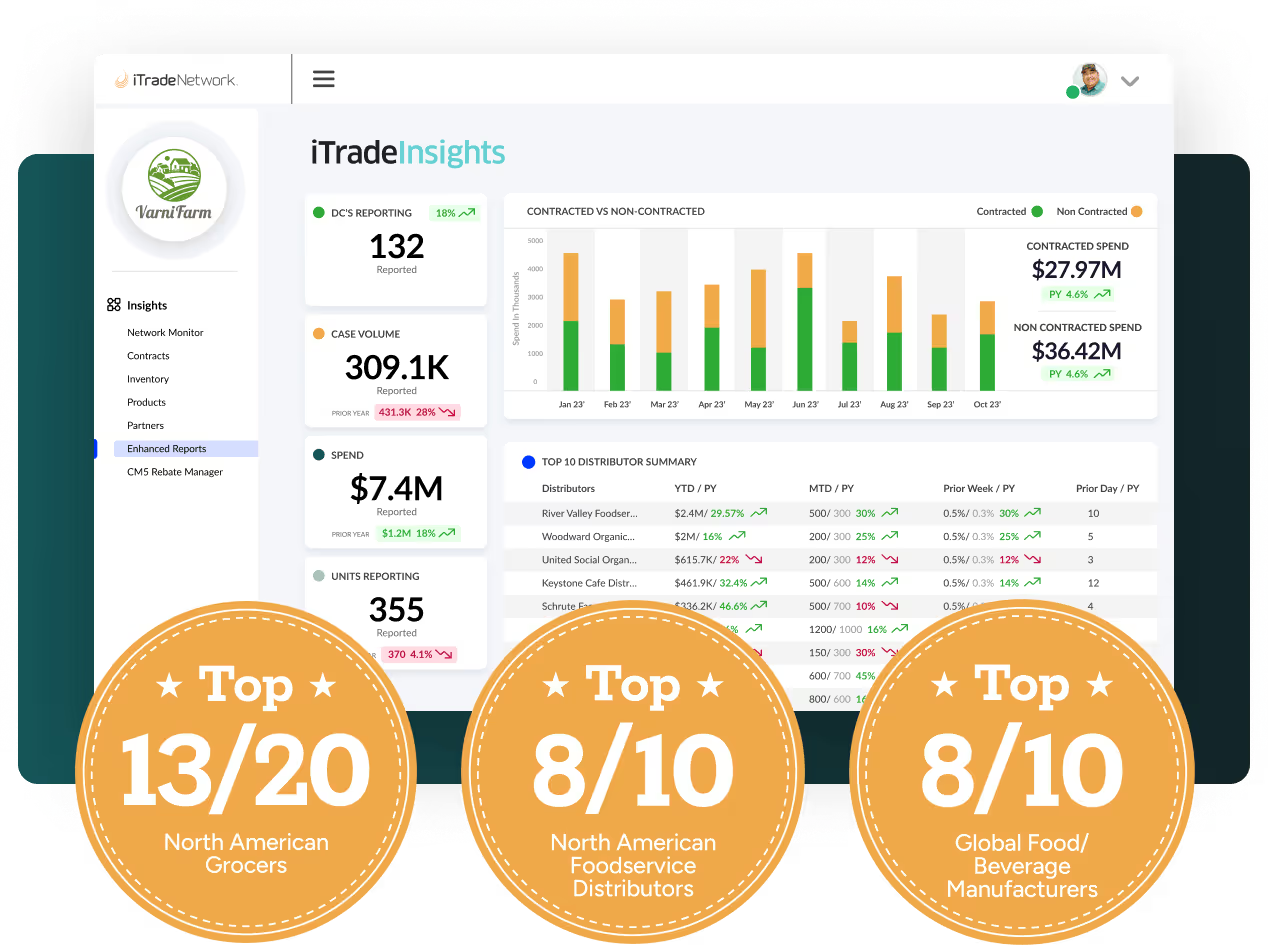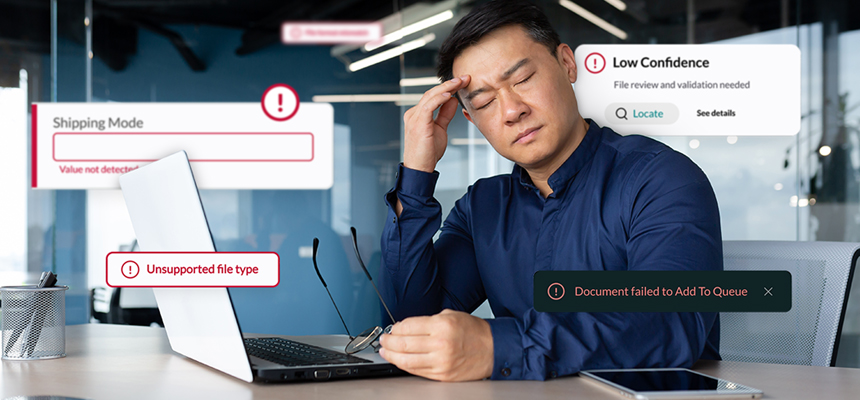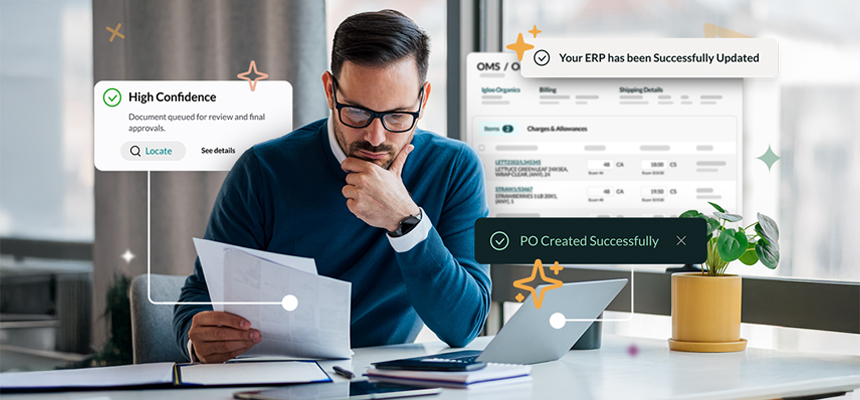Vendor-Managed Inventory: Letting Both Buyers & Suppliers Grow Their Margins

For most companies in the food and beverage industry, margins are thin. With billions of pounds of food bought and sold annually, the companies that not only succeed but grow are those that are able to implement effective, cost-saving strategies that give them a leg up against the competition. At iTradeNetwork, provide these strategies to you at every step of the supply chain so that you don’t have to.Our Order Management Solution (OMS) sees over $100 Billion in gross spend traded annually, and we have the unique opportunity to assess how North America’s top retailers and suppliers are keeping their margins as high as possible. With this data, we tailor our solutions to best serve suppliers, retailers, and everyone in between. One area in which our customers can save time and money is with Vendor-Managed Inventory.
OMS Vendor-Managed Inventory Walkthrough
What is Vendor-Managed Inventory? Vendor-Managed Inventory, or VMI, is when vendors and suppliers take control of their product within a buyer’s inventory. This procurement relationship is uniquely beneficial to both parties, allowing for buyers to focus on selling and giving suppliers the ability to maintain adequate available inventory automatically.VMI sounds great in theory—but how financially effective is it? The 2017 Datalliance Forum conducted an inter-industrial study that examined best practices for supply chains. They found that, on average, after their first year using VMI programs, participating companies saw:
- 24% reduction in out-of-stocks
- 22% increase in inventory turns
- 25% increase in items carried
- 22% increase in sales
How Does Vendor-Managed Inventory Benefit Buyers?
- Simplicity. Retailers are often working with tens of thousands—if not hundreds of thousands—of SKUs, and by letting suppliers take control over their specific SKUs, it lessens the amount of work Inventory and Procurement Managers must do on a daily and weekly basis. We know that procurement is just one task in a full day of operating a food outlet—VMI lets you focus on the more important things.
- No More “Out of Stock” Signs. Not having products in stock is one of the first ways to lose brand-loyal customers, and VMI helps to prevent this scenario. By giving control of the procurement process for specific products to their Suppliers, Retailers can ensure consistently full shelves.
- Reduce Carrying Costs. Without VMI, retailers are at the whim of suppliers to decide optimal shipping loads. By flexing VMI, suppliers can keep the level of inventory available to customers optimized and can negate any minimum-load orders. By only purchasing the amount of product required to keep your customers satisfied, you’ll lower the cost to carry that item and can reduce the need to carry any extra stock.
How Does Vendor-Managed Inventory Benefit Suppliers?
- Long-Term Predictable Orders. When Suppliers employ VMI, they gain a steady flow of income by establishing mutually beneficial procurement orders. As long as they are managing a slice of a retailer’s inventory, they’ll be able to rely on those automatic POs. Say goodbye to not knowing if your next order will come through!
- Improved Retailer Relationships. As previously mentioned, retailers have a lot on their plate. By eliminating their need to submit more POs to one of their many vendors, suppliers can help them to focus more on their business. With a continuous cycle of procurement, vendors can elevate their brand above competitors’.
- Keep Consumers Happy. Never again let your loyal customers arrive at their favorite retailer only to find that your product is unavailable. By taking control of the inventory management, suppliers can guarantee abundant, fresh products for the consumers who come back every time looking for your product.
Helpful Tip!With VMI, there’s one aspect that makes or breaks partnerships: communication. By establishing preferred methods and frequencies of communication, suppliers and buyers alike can elevate their brands and reap the benefits of this symbiotic relationship. Mutually advantageous, VMI is an easy win-win. To watch a short demo of the OMS Vendor-Managed Inventory Module, please click on the link below: OMS Vendor-Managed Inventory Walkthrough
Speak to an Expert
Take a closer look at the platform built for buyers and their trading partners

Vendor-Managed Inventory: Letting Both Buyers & Suppliers Grow Their Margins
For most companies in the food and beverage industry, margins are thin. With billions of pounds of food bought and sold annually, the companies that not only succeed but grow are those that are able to implement effective, cost-saving strategies that give them a leg up against the competition. At iTradeNetwork, provide these strategies to you at every step of the supply chain so that you don’t have to.Our Order Management Solution (OMS) sees over $100 Billion in gross spend traded annually, and we have the unique opportunity to assess how North America’s top retailers and suppliers are keeping their margins as high as possible. With this data, we tailor our solutions to best serve suppliers, retailers, and everyone in between. One area in which our customers can save time and money is with Vendor-Managed Inventory.
OMS Vendor-Managed Inventory Walkthrough
What is Vendor-Managed Inventory? Vendor-Managed Inventory, or VMI, is when vendors and suppliers take control of their product within a buyer’s inventory. This procurement relationship is uniquely beneficial to both parties, allowing for buyers to focus on selling and giving suppliers the ability to maintain adequate available inventory automatically.VMI sounds great in theory—but how financially effective is it? The 2017 Datalliance Forum conducted an inter-industrial study that examined best practices for supply chains. They found that, on average, after their first year using VMI programs, participating companies saw:
- 24% reduction in out-of-stocks
- 22% increase in inventory turns
- 25% increase in items carried
- 22% increase in sales
How Does Vendor-Managed Inventory Benefit Buyers?
- Simplicity. Retailers are often working with tens of thousands—if not hundreds of thousands—of SKUs, and by letting suppliers take control over their specific SKUs, it lessens the amount of work Inventory and Procurement Managers must do on a daily and weekly basis. We know that procurement is just one task in a full day of operating a food outlet—VMI lets you focus on the more important things.
- No More “Out of Stock” Signs. Not having products in stock is one of the first ways to lose brand-loyal customers, and VMI helps to prevent this scenario. By giving control of the procurement process for specific products to their Suppliers, Retailers can ensure consistently full shelves.
- Reduce Carrying Costs. Without VMI, retailers are at the whim of suppliers to decide optimal shipping loads. By flexing VMI, suppliers can keep the level of inventory available to customers optimized and can negate any minimum-load orders. By only purchasing the amount of product required to keep your customers satisfied, you’ll lower the cost to carry that item and can reduce the need to carry any extra stock.
How Does Vendor-Managed Inventory Benefit Suppliers?
- Long-Term Predictable Orders. When Suppliers employ VMI, they gain a steady flow of income by establishing mutually beneficial procurement orders. As long as they are managing a slice of a retailer’s inventory, they’ll be able to rely on those automatic POs. Say goodbye to not knowing if your next order will come through!
- Improved Retailer Relationships. As previously mentioned, retailers have a lot on their plate. By eliminating their need to submit more POs to one of their many vendors, suppliers can help them to focus more on their business. With a continuous cycle of procurement, vendors can elevate their brand above competitors’.
- Keep Consumers Happy. Never again let your loyal customers arrive at their favorite retailer only to find that your product is unavailable. By taking control of the inventory management, suppliers can guarantee abundant, fresh products for the consumers who come back every time looking for your product.
Helpful Tip!With VMI, there’s one aspect that makes or breaks partnerships: communication. By establishing preferred methods and frequencies of communication, suppliers and buyers alike can elevate their brands and reap the benefits of this symbiotic relationship. Mutually advantageous, VMI is an easy win-win. To watch a short demo of the OMS Vendor-Managed Inventory Module, please click on the link below: OMS Vendor-Managed Inventory Walkthrough
Unlock It Now!





